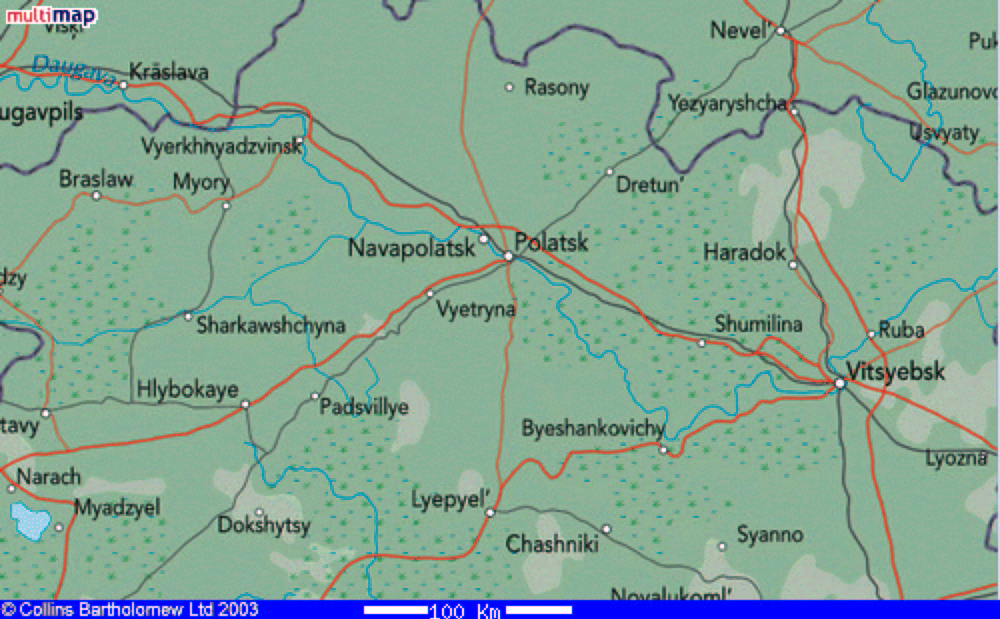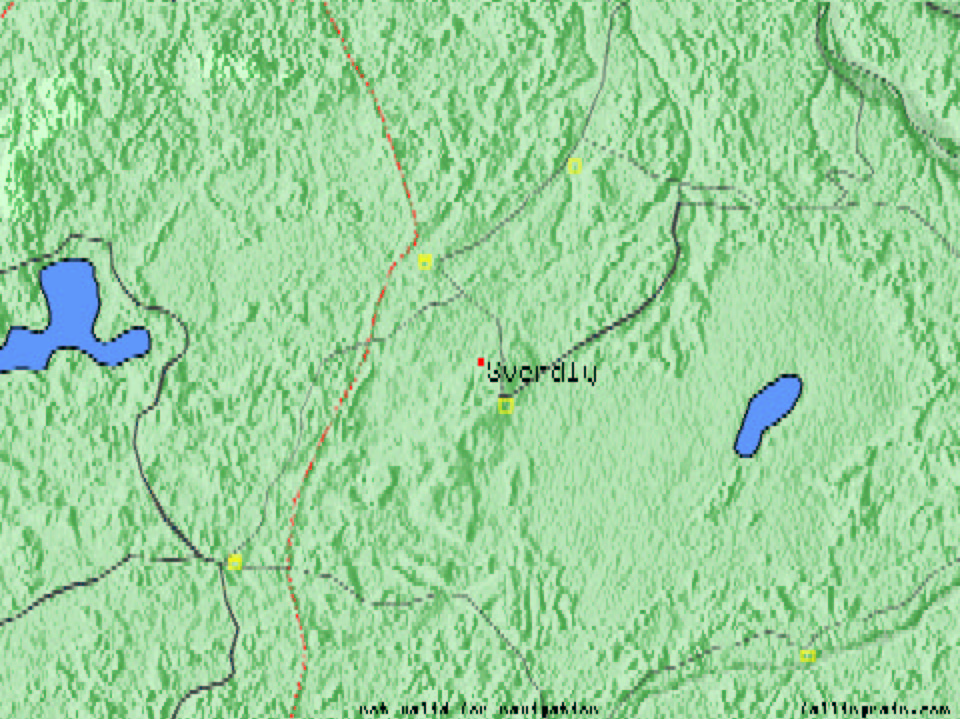I first heard the Swedish language relationship between svärd-löv and Sverdlov from my late father's business partner, Carl Johnson, who was born and raised in Sweden. Until I read about Sverdly the village in Alexander Beider's book, see below, it sounded possible. Now I doubt it. On the other hand, the red-haired, artistic relatives like my Los Angeles area sister, Zolita Sverdlove, at love-art, as well as Stewart Swerdlow, a clairvoyant and linguist, prefer the Viking connection.
Excerpts from Michele Renee Bonder e-mail 2-Dec-2004 to Andrew I. Sverdlove daughter of Sophie (Joyce) SWERDLOW, grand-daughter of Benjamin Sverdlov, the brother of Yakov Sverdlov, first Premier of Soviet Union.
Since you compiled a comprehensive webpage, some of my family's research may interest you. For instance, although you used a great source for Russian Jewish surnames, I have a different belief in the origin of our family surname of Sverdlov, which is related to Nizhny Novgorod region, and it's unique history.
I was told a few years ago, by another cousin, [Stewart A. Swerdlow, grandson of Movshe], who wrote to me "In my research I have travelled to Sweden and Norway and Denmark where I was told that the name Swerdlow was definitely of Viking origin and particularly Swedish." The origin of the family name is not Russian, but, Viking... I thought this was unlikely, but, after researching it, I believe this is true.
Sverdlov is Swedish. The name for sword in Swedish is "sverd". "lov" means "leaf".
[Ed. Note: http://lexikon.nada.kth.se/cgi-bin/swe-eng
Swedish entry word
svärd [svä:r_d] svärdet svärd svärden noun
långsmalt vapen med spets att hugga eller sticka med
English translation
sword
löv [lö:v] lövet löv löven noun
blad på träd och bus
English translation
leaf (plur. leaves) Compounds löv|skog -en---deciduous forest ]
Sword-leaf describes a signature Viking sword. The Vikings settled in Novgorod, and there was a massive conversion in the middle ages to Judaism. (Not related to the Khazars.) A basic historical reference to this:
FROM "Vikings In Russia" - http://www.dur.ac.uk/~dml0www/variagi.htmlJudaizing in Novgorod- http://www.jewishencyclopedia.com/view.jsp?artid=668&letter=J
[Ed. note: my research indicated "In the year 1000, the Viking age parliament of Iceland decided that the entire country should convert to Christianity, and that sacrifice to the old gods, while still allowed, should no longer be made in the open." http://www.answers.com/topic/religious-conversion]
The fact that the Sverdlovs were allowed to live in Novgorod, after the Tsarist Laws of 1865, for Pale resettlement, implies that they had long lineage in that town, so, they were allowed to remain, since they were also first gild craftsman. I know that Mikhail Sverdlov, my great-grandfather, was an engraver.
If they were not natives of Novgorod, (where the Vikings originally settled), they would probably not have been allowed to flourish the way they did, even through the hardest times for other Jews. They were considered very affluent, which was something that was unique for Jews, and they lived in Nizhny, which was a "sacred" city. It was difficult for Jews to have permission to live in Nizhny, St. Petersburg, (although not impossible if they had a long heritage there and were of the higher gilds...) Jews were NEVER allowed in Moskow.
[Ed. note: I am not convinced. This site http://www.orange-street-church.org/text/khazar.htm supports the above theory and is a terribly antisemitic, anti-zionist site so I doubt it's authenticity. Viking names followed the pattern of all societies so-and-so the son of so-and-so or descriptive as in Eric the Red, Andre the Ruthless. Erikson, Johnson, etc.
The Jewish Encyclopedia has this comment on business faire (http://www.jewishencyclopedia.com/view.jsp?artid=6&letter=F) "...Jews were the chief frequenters of the fairs, even in places where their permanent residence was forbidden by law. But they had to pay special admission-fees." "Merchants of the first and second gilds and their agents..." attended fairs like the ones in Nijni-Novgorod. There was always exemption for people who had special skills or were unusually bright. I interviewed a Jewish woman in 1970 who was 90-years-old and had gone to school is Moscow when it was forbidden. There is also this "clusted" of Sverdlov's from the Polotsk area. I hope we'll find more information over time.
Excerpts from A Dictionary of Jewish Surnames from the Russian Empire
by Alexander BeiderIn his Introduction to this monumental work, the most authoritative ever published, Bieder thanks works, both published and unpublished. "Abram Pribluda", he wrote, conducted his investigations of surnames during the 1960's and 1970's. Unlike Vejsenberg, Pribluda studied Jewish surnames from different regions. He collected materials from Podolia, especially his native town of Balta, and from the largest cities in the Soviet Union, surnames from telephone directories, lists of members of the Union of Composers and Union of Artists, inscriptions on tombstones and surnames of early 20th century Russian revolutionaries. In total, his file included about 8,000 Russian Jewish surnames. Unfortunately, Jewish research was politically incorrect in the Soviet Union at the time that Priblida worked. Consequently, he was able to publish only one paper written in Russian and several articles in Yiddish (in the review Sovetish Heymland). Several of his Russian-language articles also were published in the Polish scientific review Onomastica (1971, 1975, 1978). The principal fruit of his research, the book Jewish Surnames in the USSR (written in 1971 in Russian), was never published. This had nothing to do with the quality of the book; at that time the only works about Jews published in the Soviet Union were anti-Zionist works that criticized Zionism, Israel and the Jewish national mentality in general. Consequently, Pribluda's interesting and important book, which treated Jewish surnames in Russia and the Soviet Union systematically for the first time, was never published. Pribluda's manuscript and surname file were important in the general conceptualization of this book."
DICTIONARY OF SURNAMES [related to Sverdlov]
Surname (location) Type: Etymology {related surnames}
Abbreviations used: d.=district (oblast, oblasti); gub.=guberniya
Locations specify were the surname was found at the beginning of the 20th century.
Etymology: A=artificial name, O=occupational name; T=name derived from toponym (place name)
[there is no reference to Sch...there is no reference to Svedlov...there is no reference to Sverd...there is no reference to Shcherd...there is no reference to Shchver...there is no w in Russian (there is a v in Polish]
Sverdel T: see Sverdlov
Sverdel' (Lepel', Poltava gub., Ekater. gub.) T; see Sverdlov
Sverdiol (Polotsk) T: see Sverdlov
Sverdlik (Proskurov, Uman', Chigirin, common in Bendery) T: see Sverlikovskij. O:, A:sverdlyk [Ukrainian] small gimlet (small boring tool) {Sverlik}
Sverdlin (common in Disna, Vitebsk; Lepel', Drissa) T; see Sverdlov
Sverdlinskij (Bobrujsk) T; see Sverdlov
Sverdlov (common in Polotsk, Vitebsk, Lepel'; Disna, Borisov, Drissa) T; from the village Sverdly (Polotsk d., Disna d.) {Sverlov, Svirlov, Sverdel, Sverdel', Sverdiol, Sverdlin, Sverdlinskij, Sverdlovskij, Sverdlyanskij}.
Sverdlovskij (Kherson) T; see Sverdlov
Sverdlyanskij (Vitebsk) T; see Sverdlov
Sverlov (Mogilev, Vilna) T; see Sverdlov
Svetlits (Lyutsin) T: from the village Svetlitsa (Pinsk district)
["Svet..." derives from Russian for "light".]
Sviridovskij (Vitebsk, Nevel') T: from the village Sviridovka (Borisov district) {Sveridovskij}
Svirlov (Kherson) T: see Sverdlov.
Continuation of quotes from A. Beider:
"In 1772 and 1793, portions of Poland were ceded to Prussia, Austria and Russia. In 1795 the final partition of Poland ceded the balance of Poland to these three countries, and Poland ceased to exist as an independent country until 1918. In the part ceded to Russia, Jews were permitted to live only in the area just acquired. This area became known as the Pale of Settlement... (Note: Livonia and Courland... were not part of the Pale.)"
Borisov is in Minsk guberniya (province), at the northern end, south and slightly west of Lepel'. Lepel' (Vitebsk guberniya) is south of Polotsk (Vitebsk guberniya) (in betweens Borisov and Polotsk). Lepel' is also south-west of Vitebsk (the city). Disna and Drissa (today's Verkhnedvinsk) are near each other, north-west of Polotsk on the border between Vitebsk guberniya, Byelorussia (Belarus) and Vilna guberniya (Lithuania).
| Bialystok, Grodno guberniya, Poland | Lepel', Vitebsk guberniya, Belarus (Lyepyel' on map) |
| Bobrujsk, Minsk, Belarus | Lyutsin (Ludza), Vitebsk guberniya, (current day Latvia) |
| Borisov, Minsk, Belarus | Minsk, Minsk guberniya, Belarus |
| Bratslav, Poldlia, Ukraine | Mogilev-Podol'skij, Podolia, Ukraine |
| Brest-Litovsk, Belarus | Mogilev, Mogilev, Belarus |
| Bykhov (Starj Bykhov), Mogilev, Belarus | Nevel', Vitebsk, Russia |
| Chernikov, Mogilev, Belarus | Novograd-Volynskij, Ukraine |
| Chernigov, Ukraine | Novogrudok, Belarus |
| Chigirin, Ukraine | Odessa, Kherson, Ukraine |
| Disna, Vilna, Belarus | Orsha, Mogilev, Belarus | Drissa (Verkknedvinsk), Vitebsk, Belarus | Pinsk, Belarus |
| Dvinsk (Daugavpils), Vitebsk, Latvia | Lyutsin (Ludza), Vitebsk guberniya, (current day Latvia) |
| Ekaterinslav, Ekaterinslav, Ukraine | Polotsk, Vitebsk, Belarus (Polatsk on map) |
| Elisavetgrad, Kherson, Ukraine | Poltava, Poltava, Ukraine |
| Gomel', Mogilev, Belarus | Sebezh, Vitebsk, Russia |
| Gorki, Mogilev, Belarus | Senno. Mogilev, Belarus |
| Gorodok, Vitebsk, Belarus | Simferpol', (Crimea), Terata, ? |
| Grodno, Belarus | Vilna (Vilnius), Vilna, Lithuania |
| Kherson, Kherson guberniya, Ukraine (New Russia) | Vitebsk, Vitebsk guberniya, Belarus (Vitsyebsk on map) |
| Kiev, Kiev guberniya, Ukraine (New Russia) | Zhitomir, Ukraine |
| Kishinev, Bessarabia guberniya, Moldova | Zvenigorodoka, Ukraine |
The guberniya are like our "counties". Thus, if I live in White Plains, the county center of Westchester County, New York State it is like living in Vitebsk, Vitesk. But if I live in Scarsdale it is like Lepel', Vitebsk, Vitebsk gubernia. Boston, Suffolk, MA; Philadelphia, Philadelphia County, PA. The little shtetls of our ancestors were 300 to 3000 people. Sort of like Flushing, Queens County, New York City, NY is equal to Beshincovicki, Lepel', Vitebsk, Byelorussia. When grandpa said he came from Minsk he might have lived 10-15 miles from Minsk (City) in Shchedrin (village), Bobrujsk (district), Minsk (guberniya), Belarus (state)!
Furthermore, political boundaries changed. Parts of the Ukraine today, were in Poland before the Partition. Similarly, parts of Vitebsk guberniya shifted to Minsk guberniya or to modern day Latvia.
PRONUNCIATION
Pronunciation varied, so they way the immigration clerk wrote the manifest varied. Similar misspellings occurred with the Declaration of Intent and later the Petition for Naturalization. In Russian the name is written and pronounced Sverdlov. In Polish it is written Swerdlow but pronounced Sverdlov. The Yiddish pronouciation varied, too.
SWEDLOW
Sore Swerdlow, the oldest sister of (first) Premier Yakov Mikhailovich "Andrei" Sverdlov, (1885-1919), the Russian revolutionary and Communist leader, emigrated with her husband from Libau on 23-Jan-1913 and arrived in the Port of New York on the Steam Ship "Birma" 15-Feb-1913. Her husband was her cousin, Dawid Swerdlow. Everyone stated they were born in "Palatzk" [sic], e.g. Polotsk, Belarus, and they left from a friends home in "Krementicz" [sic], e.g. Kremenets, Ukraine (spelled Krzemieniec in Polish) located at latitude/logitude 50°06' / 25°43. The ship manifest reads Dawid Swerdlow husband...thus we know David Sverdlov is the correct pronouciation. Sore, wife, is Sara/Sofie. Schmuel, age 5, becomes Samuel. Mowscha, age 3, is the endearment name for Mosche. Later he is Morris Swedlow. Chaie Swerdlow, age 9 months, later will be know as Ida Swedlow. They are going to David's brother "M. Swerdlow at 502 West 125th Street, New York, NY."
Hirsz Swierdlow arrived in the Port of New York, on the steam ship "Finland" from Antwerp, Belgium. It was December 31, 1922. Hirsz was 17 years-old. He had left his sister, Chaja Swierdlow in Glebok, Poland to go to his brother Louis Swerdloff who lived at 228 South 59th Street in Philadelphia. Chaja lived in Glebokie (Polish; Glubokoye in Russian), Belarus.
SWEDLOFF
Moshe Sverdlov was born abt 1863/1866 in Belitsa, Lida, Vilna, Byelorussia. was variously written Mojca Swierdlow, Moische Swerdlow and Morris Swerdloff. Petition for Naturalization of Moische Swerdloff; 1926; Petition for Naturalization of Moische Swerdloff filed 1926 in U. S. District Court, Eastern Pennsylvania, Philadelphia PA Petition #78111, dtd 31-Aug-1926). Certificate of Naturalization granted, with name change, to Morris Swedloff; 1927; (#2401320, dtd 24-Feb-1927)
(Sonja Swerdlow/Sonia Sverdlova)
.jpg)
Return to top of page
One can create wonderful family histories if there is a lot of detail. Such an example is Movsha Sverdlove.

